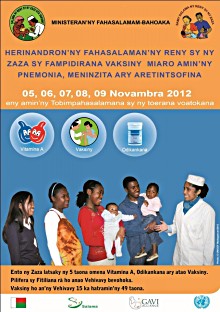
Vatomandry, Madagascar, 5 November 2012 - Madagascar’s first pneumococcal vaccine was delivered in the coastal town of Vatomandry on Tuesday, a signal to thousands of health and community workers to start immunising the nation’s children against the primary cause of pneumonia.
The high-level event celebrating the introduction of the vaccine for newborn children kick-started Madagascar’s nationwide celebration of the 13th Mother and Child Health Week. As part of this event, four million children under five years of age and one million pregnant women will receive vital health interventions.
Great day
"This is a great day for the children of Madagascar as they will be better protected against one of the major cause of infant mortality" said Marie-Ange Saraka-Yao, Director of the GAVI Programme Funding Team. Pneumonia is responsible for 18% of all under-five deaths in Madagascar.
Madagascar is the 21st GAVI-eligible country to introduce pneumococcal vaccine with the support of GAVI and its partners. By 2015, more than 50 GAVI-eligible countries are expected to have introduced the life-saving vaccine, just a few years after it reached wealthier countries.
National priority
"Madagascar has made immunisation a national priority and has used innovative approaches to reach every child in each district,” added Saraka-Yao. “These efforts have had an impact but the effort must continue.”
Underlining the Government’s commitment to its national immunisation programme, some 8,284 health workers and 22,557 community workers have been mobilised to deliver pneumococcal vaccine across 22 regions in Madagascar.
Successful programme
Over the last two decades, Madagascar has been one of a handful of countries to reduce its child mortality rate by 60 percent thanks in part to a successful national immunisation programme. However, according to UNICEF, coverage has recently slipped back due to a number of challenges.

Vatomandry, Madagascar, 5 November 2012 - Madagascar’s first pneumococcal vaccine was delivered in the coastal town of Vatomandry on Tuesday, a signal to thousands of health and community workers to start immunising the nation’s children against the primary cause of pneumonia.
The high-level event celebrating the introduction of the vaccine for newborn children kick-started Madagascar’s nationwide celebration of the 13th Mother and Child Health Week. As part of this event, four million children under five years of age and one million pregnant women will receive vital health interventions.
Great day
"This is a great day for the children of Madagascar as they will be better protected against one of the major cause of infant mortality" said Marie-Ange Saraka-Yao, Director of the GAVI Programme Funding Team. Pneumonia is responsible for 18% of all under-five deaths in Madagascar.
Madagascar is the 21st GAVI-eligible country to introduce pneumococcal vaccine with the support of GAVI and its partners. By 2015, more than 50 GAVI-eligible countries are expected to have introduced the life-saving vaccine, just a few years after it reached wealthier countries.
National priority
"Madagascar has made immunisation a national priority and has used innovative approaches to reach every child in each district,” added Saraka-Yao. “These efforts have had an impact but the effort must continue.”
Underlining the Government’s commitment to its national immunisation programme, some 8,284 health workers and 22,557 community workers have been mobilised to deliver pneumococcal vaccine across 22 regions in Madagascar.
Successful programme
Over the last two decades, Madagascar has been one of a handful of countries to reduce its child mortality rate by 60 percent thanks in part to a successful national immunisation programme. However, according to UNICEF, coverage has recently slipped back due to a number of challenges.
